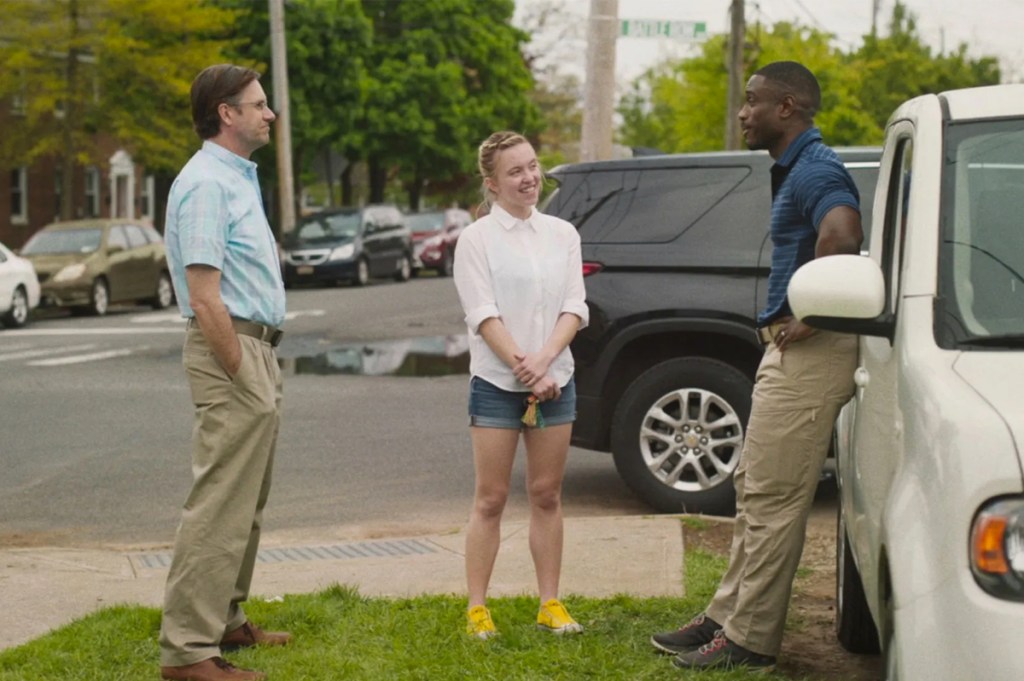Reality is an edge-of-your-seat thriller that isn’t like any edge-of-your seat thriller you’ve encountered before. Trust me. It’s a docudrama that isn’t “based on a true story” because it is a true story. It’s an enactment of the FBI’s interrogation of American whistleblower Reality Winner. Taken directly from the transcript of the audio recording, the word-for-word screenplay includes every cough, every “um,” every dog bark, every banality, no embellishments. Yet it’s more terrifying than any film that has set out to terrify (see: Sisu). You should trust me on this too.
The film is directed with clarity and precision by Tina Satter, a playwright who discovered the transcript online and first turned it into a theatre piece (Is This a Room). You may not have heard of Reality Winner. I hadn’t. Her name doesn’t seem to be up there with Chelsea Manning or Edward Snowden. I don’t know why. Sydney Sweeney is Winner and she is phenomenal, but we’ll get to that later.
The film opens, like the audio recording, with Winner returning to her home in Augusta, Georgia, on June 3, 2017. She is 25, and wearing cut-off jeans. It’s a Saturday, she’s just been grocery shopping, and here are two FBI agents waiting on her doorstep. The agents, Garrick (Josh Hamilton) and Taylor (Marchánt Davis), are friendly as hell. She’s a National Security Agency translator, fluent in Farsi, Pashto and Dari, and they’re awestruck. “Wow. That’s impressive. I am barely able to speak English,” says Garrick. Winner laughs. “English is hard,” she jokes. They talk about her passions (yoga, Crossfit, animals) and show concern for her rescue dog and the rescue cat who is fat: “Girl likes to eat,” says Winner. (This is sometimes funny.) We know, and she knows, that their amiability is in the service of something dark. But she doesn’t know what they know exactly. Yet. They know she knows that. What follows is a dance of entrapment.
The agents make out they are klutzes. They are, they tell her, investigating the mishandling of a classified document about Russian interference in the 2016 election that turned up on an American website. They discombobulate her by, initially, focusing on mundanities. Would she like to get her perishable groceries out of the trunk of the car into her fridge? It’s often surreal, considering what’s at stake. They casually say that she can come to their office if she wants, but maybe they could just do it here? (This, I now know, would mean that they didn’t have to read out her Miranda rights or offer her a lawyer; you will go down a rabbit hole of your own afterwards.)
They end up in an unfurnished room in Winner’s house, just the three of them in conversation. She has to think on her feet, literally, offering alternative hypotheses as to how the document was released. Occasionally, there’s a crackle as the screen goes black, mirroring redacted passages in the transcript. Or there is a flashback to Winner sitting at her desk at the NSA, where Fox News was played constantly in the background. (“And, um, I’ve filed formal complaints about them having Fox News on, you know? Uh, just at least, for God’s sake, put Al Jazeera on, or a slide show of people’s pets.”) But those are the only flourishes.
Sattar’s deliberate spareness gives this an unnerving, eerie quality while Sweeney’s performance is truly phenomenal. She plays Winner’s mounting dread and anxiety in a way that’s so authentic it will possess you. I think it’s clear whose side Satter is on, but I won’t say more in case you don’t know how it ends. Trust me, it’s good.
This article was originally published in The Spectator’s UK magazine. Subscribe to the World edition here.





















